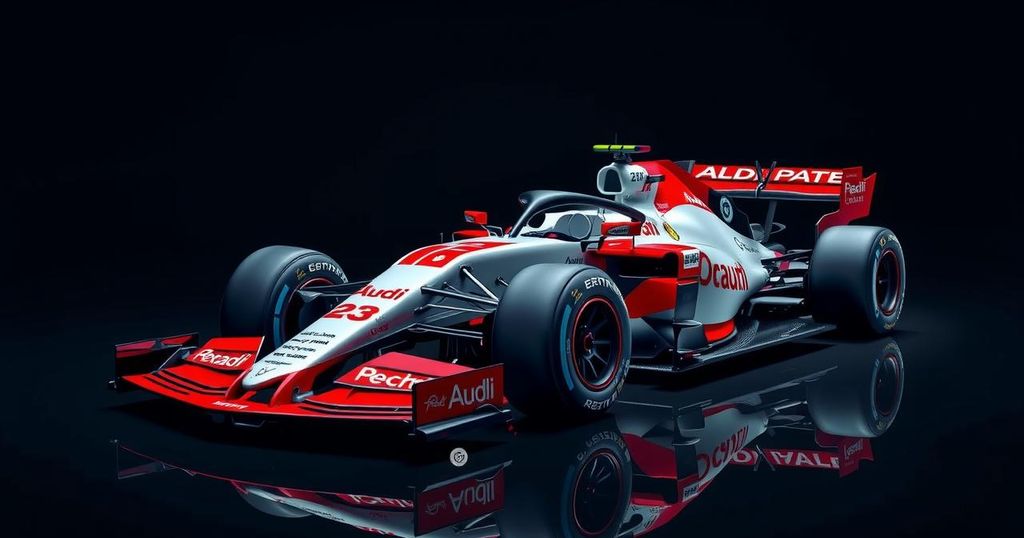Qatar’s investment in Audi’s Formula 1 team amid Volkswagen’s financial turmoil reflects a strategic move to diversify away from fossil fuels and leverage opportunities within motorsport. The deal, valued at $350 million for a 30% stake, allows Audi to de-risk its F1 investments while Qatar seeks profitable ventures. Gulf states, including Qatar, continue to balance between traditional combustion engines and electric vehicle demands as they explore new energy technologies.
Qatar’s recent acquisition of a 30% stake in Audi’s Formula 1 team, valued at $350 million, marks a strategic move amid turbulent times for Audi and its parent company, Volkswagen Group. The Qatari Investment Authority (QIA), a significant stakeholder in Volkswagen since 2009, is seizing an opportunity to leverage Audi’s F1 aspirations while diversifying away from traditional fossil fuel investments, despite the group facing a sharp decline in profits due to decreased sales in key markets like China and Europe. This partnership allows Audi to concurrently de-risk its substantial F1 investments while maintaining participation in a sport that has seen a rise in global appeal and financial stability post-Bernie Ecclestone.
Audi’s initial strategy to ramp up its shareholding in the Sauber Formula 1 team to 75% encountered unforeseen challenges, leading to an urgent need for additional resources for advancement in the sport. The company’s shift in strategy is evident as it pursues a total buy-out by 2026 to enhance competitiveness, a realization driven by the ineffectiveness of its former plans. As the F1 landscape is evolving, with electric vehicles increasingly in the spotlight, Qatar’s investment demonstrates a keen interest in balancing traditional combustion engines with the realities of an electrified future.
Qatar’s substantial sovereign wealth fund, boasting nearly $500 billion in assets, reflects its diversification goals, with interests spanning numerous sectors, including high-profile stakes in football and other industries. This investment in F1 is part of a broader strategy by Gulf states to transition away from reliance on fossil fuels while exploring opportunities in synthetic fuels and related technologies, highlighting the nuanced relationship between the automotive industry and energy production.
Simultaneously, Audi’s challenges are symptomatic of broader trends within the automotive sector grappling with consumer skepticism toward electric vehicles. Qatar’s financial commitment to Audi’s F1 program not only underscores its ambitions in motorsport but also signifies the potential to profit from a sport poised to grow despite the power shifts in the engine debate. Thus, while the automotive industry undergoes significant transformation, Qatar’s involvement may represent a promising avenue for innovation and investment in motorsports amid the shifts in global energy dynamics.
The Qatari Investment Authority’s investment in Audi’s Formula 1 team emerges from a larger context of economic diversification for oil-rich Gulf states, particularly Qatar. Motivated by the need to transition from fossil fuel dependency, these nations are exploring new economic avenues, with motorsports and F1 representing lucrative investments amidst a changing automotive landscape. As they venture more deeply into various sectors, Qatari investments reflect a commitment to intertwining traditional automotive practices with the future of electrification while managing existing investment risks as the industry adapts to market demands.
In conclusion, Qatar’s strategic purchase of a stake in Audi’s Formula 1 program illustrates a calculated response to both Audi’s financial challenges and Qatar’s diversification efforts. Despite Volkswagen’s recent profit downturn, the partnership allows Audi to mitigate risks within F1 while providing the Qatari Investment Authority an entry point into an increasingly valuable sports domain. As both parties adapt to a rapidly changing automotive landscape, their alliance signifies a pivotal moment in the evolution of motorsports amid the ongoing debates surrounding electrification and traditional engine technologies.
Original Source: www.autosport.com






